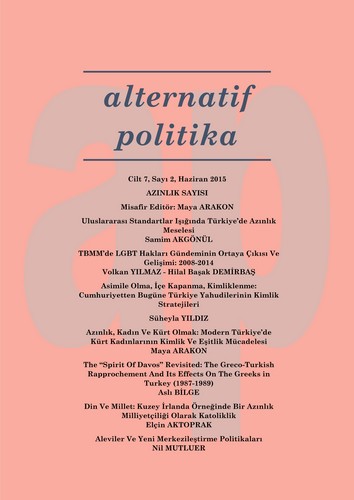Asimile Olma, İçe Kapanma, Kimliklenme Cumhuriyetten Bugüne Türkiye Yahudilerinin Kimlik Stratejileri
Being Assimilated, Introversion, Acquiring Identity, Identity Strategies of Turkish Jews since the Republican Era
Author(s): Süheyla YildizSubject(s): Jewish studies, Political history, Social history, Politics and Identity
Published by: Rasim Özgür DÖNMEZ
Keywords: Assimilation; Jewish People of Turkey; identity strategies; acquiring identity; integration;
Summary/Abstract: The identity strategies of the Jews, the non-Muslim minority perceived as the most stable group for integration into national identity during the Republican history, developed to integrate into the society and preserve their community identity at the same time have characteristics both similar to and different from those of the other minority groups. In this study, these strategies forming three different phases for the development of identity during three different periods will be discussed. Firstly, the Turkization effort that the Jews invested in order to be admitted as equal Turkish nationals during the single-party period, from the establishment of the Republic to 1942 when the Wealth Tax was enacted will be mentioned. As it is known, during the foundation period of the Republic, being a Turkish national was equated with being Turkish and/or Muslim; non-Muslims were not conceived as a part of the national identity. In this period where a series of anti-minority practices took place; the Jewish people, who had been banished from their homeland due to the Thrace pogroms of 1934, were deeply disappointed, in particular,at the Wealth Tax of 1942 based on ethnic discrimination. Believing that their Turkization efforts could in no way enable them to be “Turkish”, they entered into a long period of introversion instead of melting in Turkism. This long period, in which it was understood that introversion was unable to resolve problems, ended by the public gain of visibility for Jewish identity with lobbying activities that the Quincentennial Foundation conducted in favor of Turkey in 1989. Thus, a third phase which still continues has started. With this third phase started in 1990s where cultural identity movements developed and identity problems were publicly discussed; the Jewish community aims to integrate into society and avoid the symbolic violence towards them which is concretized as anti-semitism by following an extroversion strategy and by maintaining the Jewish identity. In other words, the community aims for integration by acquiring identity. The current study seeks to discuss each of the three strategies, with a special focus on the extroversion strategy, by explaining their social-political contexts, instruments, rhetorics and actors.
Journal: Alternatif Politika
- Issue Year: 7/2015
- Issue No: 2
- Page Range: 257-290
- Page Count: 34
- Language: Turkish

